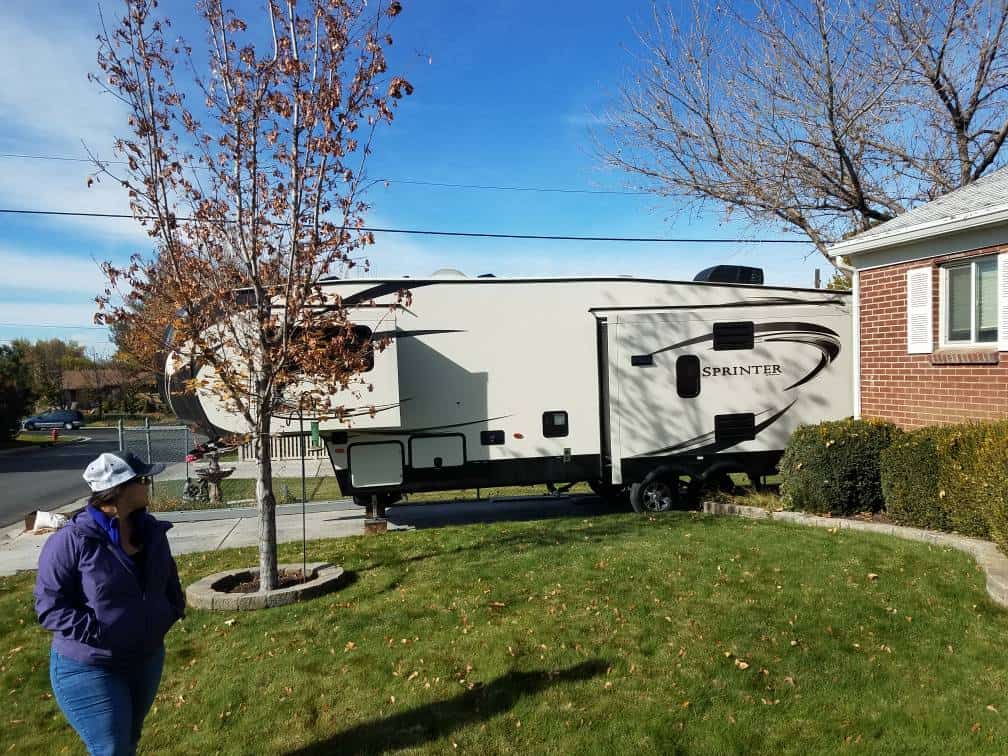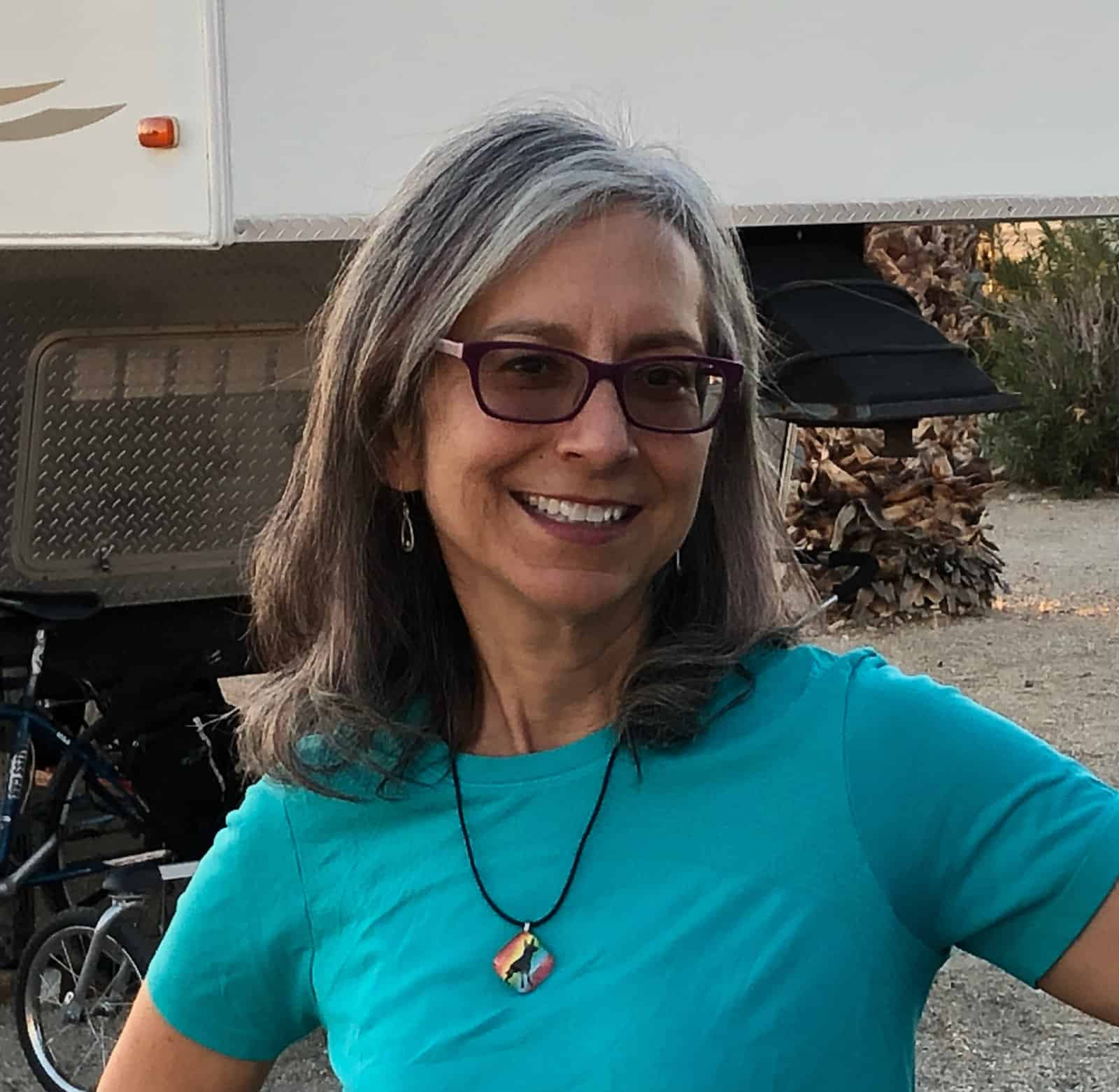Backyard RV living is becoming an increasingly popular housing arrangement that’s embraced by some and not so much by others. But like it or not, many people are parking their recreational vehicles on private property as an alternative to high-rent housing, RV parks, or campgrounds. They live in their camper as a way to save on rent, and oftentimes to also have the freedom to travel without being burdened by traditional housing commitments.
However, before you decide to set up your RV in a backyard campsite, it’s important to understand the controversy, laws, and regulations that impact this type of long-term RV parking arrangement. In this article, we explore backyard RV living pros, cons, and basic information necessary to decide if this is something you do or don’t want to try.
What is Backyard RV Living?
Let’s start this guide by making an important distinction between two very different RV parking arrangements. Backyard RV living is not boondocking. It also isn’t RV moochdocking, a different type of camping spot for traveling RVers who park on a friend or relative’s private property for a short-term stay.
People choosing to park next to someone’s house often find that it’s relatively easy to have full RV hookups and other utilities normally found with a permanent residence. Backyard RV campers often have access to amenities like a permanent sewer connection, on-site laundry, internet connectivity, trash service, and sometimes even a storage shed. These bonuses add to the appeal of backyard RV camping in a neighborhood, especially when traditional housing is in short supply or unaffordable.

Moochdocking usually doesn’t red raise flags.
The regulations for short-term moochdocking and long-term backyard RV living can differ significantly. For example, you may find that short-term moochdocking stays don’t require any special permits or licenses. That’s usually because many RV moochdockers do a good job of not overstaying their welcome. They don’t often tap into utilities, and most stay off-grid in an attempt to remain as low-key as possible.
As long as they don’t camp long enough to raise red flags with authorities, or neighbors who don’t want a camper parked in their neighbor’s yard, moochdockers generally get in and get out without being noticed or ticketed.
Whether you moochdock or plan on a longer stay, anytime you live in an RV on a piece of property for which it was not intended, you must know the neighborhood RV parking laws before setting up camp.
Long-term RV camping in a neighborhood is subject to more stringent regulations, permits, and public scrutiny. That’s because these additional long-term guests will use more utilities and resources than normal for that specific property. Their towed vehicle might also steal a neighborhood parking space, too.
Backyard RV living in someone’s yard or driveway is not usually looked at favorably by other property owners, renting neighbors, or most municipalities. Almost every week, another city or county in the U.S. creates a new “nuisance” laws against backyard RV living.
Currently in some parts of the country with severe housing shortages, many people are trying backyard RV living despite the downsides shared below. But before deciding to join the growing numbers of people setting up long-term RV campsites on someone’s property, understand the laws. You want to find out if backyard RV living is worth the hassle of setting up. Or, possibly getting kicked out by authorities without any warning.
What Are the Pros and Cons of RV Camping on Your Own Property?
Even if you own the land and the RV that you want to permanently park on it, you are still subject to many complicated local and state laws. Do not buy any property until you know those laws!
In some places you are allowed park on your own land as long as you want. In others, you can only park during certain times of year (usually summer). And in others, you can only park if you have pulled a permit to build a sticks-and-bricks house within a certain amount of time. Some places in the US are easier to attempt this than others. Generally the more rural an area, like Alaska, the less bureaucracy (but not always).
Even if you are allowed to park on the property, pros and cons still exist.
The Pros of Backyard RV Living
Backyard RV living can be a great option if you want to downsize, live more sustainably, save money, or simply have the freedom to move around.
- It’s a unique, low-cost lifestyle.
- You get all the comforts of home
- And you can still travel if your RV is well-maintained
The Cons of Backyard RV Living
Even if you set up camp in a legal RV parking location, living in an RV full-time while parked on someone’s residential property is not a set-it-and-forget-it thing.
- A parked RV still needs regular waste disposal by tapping into the household sewer system.
- And a parked RV is still highly susceptible to natural disasters and extreme weather.
- Any RV parked in a backyard still needs regular upkeep and mechanical care.
- If you are renting, you may be asked to leave at any time.
Aside from these issues, federal, municipal, and local laws usually make backyard camping difficult if not outright impossible. Many towns and homeowners association regulations put up roadblocks that prohibit the practice backyard RV living. Often with good reason, as shown in this news clip.
Even the Federal Government Makes Backyard RV Living Difficult
It doesn’t matter how far away you live from Washington, D.C. The U.S. Department of Housing and Urban Development (HUD) impacts laws about backyard RV living. This is because it sets the groundwork for all aspects of federal laws that ensure fair, affordable, and safe housing. One of its roles is to set the technical definition of housing structures. For example, HUD spells out the definition of a single-family residence, a mobile home, and a recreational vehicle.
The federal government clearly defines a recreational vehicle as one that is:
built on a vehicular structure, not certified as a manufactured home, designed only for recreational use and not as a primary residence or for permanent occupancy,
US Department of Housing and Urban Development
As a result, zoning laws around the country must follow this definition when considering what is and is not allowed in residential areas. That’s one reason why mobile home parks tend to be concentrated on the outskirts of a town.
Local Zoning Laws are Also Against Backyard RV Camping
A county’s zoning laws are designed to regulate land use within a specific area. They dictate what types of structures can be built, where they can be located, and how they can be used. If permanently parking an RV in someone’s backyard is not allowed, it is illegal to do so.
Zoning laws vary from one jurisdiction to another. Some areas may have specific ordinances that prohibit or restrict long-term RV parking on private property. Others (especially in rural areas) may have more lenient rules. In some parts of the country, RV are simply considered an “accessory dwelling unit” (ADU), like a garage apartment or mother-in-law cottage.
HOA Rules Make Long-Term Backyard RV Parking Tricky, Too
Many communities are also subject to homeowner’s association (HOA) laws. HOA rules are meant to maintain the appearance and property values within a community. Most HOAs have strict guidelines, not only about what permanent residences look like in the neighborhood, but about what kind of vehicles get to park on the street, driveway, or even the backyard. As a result, even curbside RV parking is illegal in many HOA neighborhoods.
How to Live Legally in an RV Parked in Someone’s Backyard
Do you know for certain that it is not illegal to camp in a backyard at your chosen destination? Or, on the property you want to buy? If yes, consider yourself lucky. However, you still need to address other requirements and restrictions, such as:
Long-Term RV Parking Permits and Other Considerations
You probably need to obtain permits or licenses in order to stay legal. These permits may be required by the local government or other regulatory agencies. Specific RV parking requirements can vary widely, and that’s another area where a professional can help you make it a permanent parking situation.
Environmental Considerations to Minimize Your Footprint
Backyard living can have an impact on the environment, so it’s important to consider and mitigate any potential negative effects. This may include proper waste disposal, water conservation, and minimizing energy consumption to avoid impacting the local power grid.
Some areas may have specific regulations or guidelines regarding environmental practices for backyard RV living. Your goal is to make your permanent RV living arrangement is sustainable and environmentally responsible.
RV Insurance (and other considerations)
Even though backyard RV living takes you off the road, you still need to get the best RV insurance. The property owner where you are parking should also review their homeowner’s insurance policy. They need to determine if their insurance covers backyard RV living. Some property owners may need to obtain additional coverage for RV parking guests.
As the RV owner, you also have risks and liabilities when renting. Call your insurance agent to make sure you have enough coverage to protect yourself and your property.
Conclusion About Long-Term RV Parking in a Backyard
Backyard RV living can be a rewarding and fulfilling lifestyle. But it’s far more complicated and risky than moochdocking or traditional full-time RV living. You must understand and comply with the laws and regulations for this type of arrangement. And know what kind of RV maintenance is required to keep your rig in traveling shape.
Don’t give backyard RV living a try until you understand all of this. Zoning laws, HOA rules, building codes, permits, environmental considerations, and insurance are all equally critical things to consider.
Do your research about staying in compliance with local laws and regulations. Only then can you enjoy the benefits of backyard living without breaking laws.


